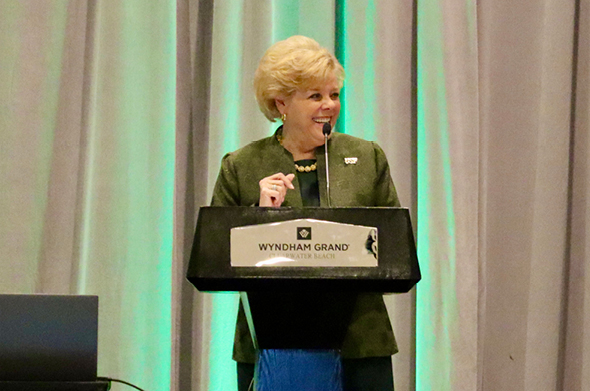Alumna, USF Pres. Rhea Law Headlines 2023 Higher Ed Law Conference

The state of higher education may be in flux, but industry leaders say there will always be a constant: the vital role colleges and universities play in their communities.
That was a key takeaway from the 44th Annual National Conference on Higher Education, which took place March 1-6 at the Wyndham Grand Clearwater Beach. This year’s theme was “Rewriting the Ground Rules of Higher Education Law and Policy for the 21st Century.” Leaders from nearly every aspect of campus life – Title IX officials, mental health experts, public safety officers, general counsel, and more – spoke passionately about how they are adapting as a shifting higher education landscape changes how they serve students and other critical constituencies.
Though the focus was often on subjects like political polarization, student health and wellness challenges that were exacerbated by Covid-19, and a looming enrollment cliff, the conference atmosphere was one of camaraderie and optimism as higher education workers reflected on their work and why they do it. “This year’s empowering interdisciplinary event, featuring exceptional access to leading subject matter experts, gave participants many tools to return to campus to meet the challenges that lie ahead for higher education,” said Conference Chair Peter Lake, Charles A. Dana Chair, Professor of Law, and Director of the Center for Excellence in Higher Education Law and Policy at Stetson Law.
A sunny keynote from USF President Rhea Law
Higher education may be in turmoil, but this year’s keynote speaker, University of South Florida President Rhea Law, a Stetson Law alumna, focused on the strategies, mindsets, and actions that have helped USF face the most pressing challenges.
One big component: cutting through the noise by telling the right story about how the institution’s value extends well beyond the four-year degrees it issues.
“We give students background and thought processes so that they can solve the problems of the future, and we give them that connection to us so that they continue to be educated and skilled on things that they need,” Law said.
Then, there’s a college or university’s role as a community cornerstone for constituencies of all ages. Law spoke about USF’s Lifelong Affinity Model, which engages groups of every age. This includes everything from summer programming for k-12 students, pre-college programs, professional education, and courses for older adults who want to keep learning and stay connected.
Also critical: creating a sense of belonging for everyone on campus – and supporting students who are experiencing mental health challenges.
“There are so many students now who are wrestling with mental health,” Law said. “They clearly can’t be successful when they go out about the business of life if they don’t have support for them; if they don’t have the mental health and a wellness component. So we’ve been prioritizing our work around that.”
The first USF graduate to ascend to the university’s presidency, Law’s community involvement is incredibly far-reaching. She served on the Stetson Law Board of Overseers, led a law firm, and served on a seemingly countless array of boards of important nonprofits and companies.
See Law’s full bio.
What gets them up in the morning
At an interactive Friday afternoon panel, moderator David Rowe, President of the higher-education consulting firm Windermere Group, LLC asked the panelists what keeps them up at night.
The question launched the panel, consisting of four higher ed leaders, into a frank discussion of how the Covid-19 pandemic, a polarized political climate, and public perception of higher education.
“I think right now we’re at a crisis point at how higher education is perceived,” said Frederick Lawrence, who is secretary and CEO of Phi Beta Kappa Society.
That perception is in stark contrast to reality, the panelists agreed, given the role colleges and universities play in their communities.
“That image of the isolated ivory tower is very outdated,” said panelist Jonathan R. Alger, President of James Madison University. “During Covid, where did people go in the Shenandoah Valley when they needed Covid testing? They came to our campus. Where did people go when they needed vaccines? They came to our campus.”
Rowe closed with a question that paralleled his first question to the panel: what gets them out of bed in the morning. They all agreed: it’s the students.
“It’s just a rush,” Law, who participated in the panel following her keynote address, said. “It’s all about the students. And it’s all about the research that our faculty does.”
Alger agreed.
“We talk about it all the time on our leadership team – if you’re having a bad day, go out and spend some time with the students,” he said. “And I would say particularly, our students that come from a less privileged background who are so grateful for the opportunity to be in a university setting.”
Working to further the mission of higher education is also a key motivator.
“I believe in higher education as a public good. I think, as a sector, getting to wake up and live and breathe in a place of constant lifelong learning is a real gift for all of us,” said Jacob Rooksby, Dean of Gonzaga University School of Law. “These are great jobs to have, but we’re all working together for the students and in service to the mission.”
Learn more about the National Conference on Higher Education Law and Policy.
Post date: March 14, 2023
Media contact: Kate Bradshaw
[email protected] | 727-430-1580